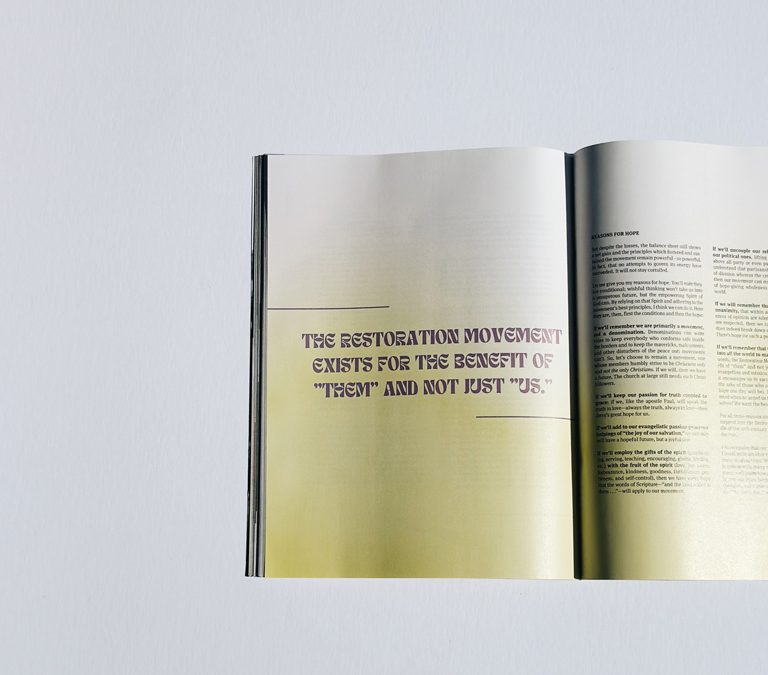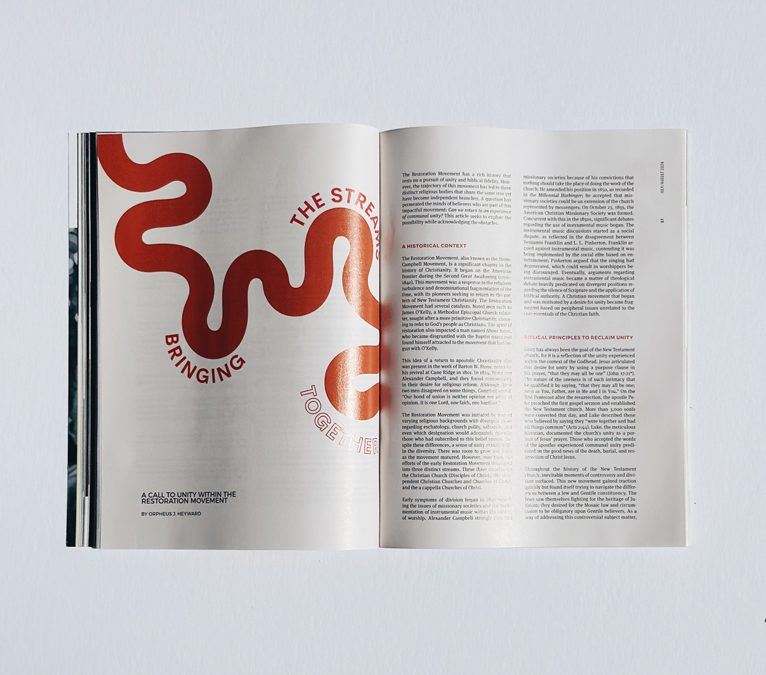By Marty Solomon
“Trust me.”
Those aren’t popular words these days. We’re waking up to the reality of institutional abuses, cultural messaging, and half-truths. Simply put, we don’t trust anybody but ourselves.
God has always invited his creation into a place of trust. Hebraic thought talks about this using words in which we place great theological stock: belief, trust, hope, faith. These words speak of the dynamic relationship between God and his creation. From the opening chapters of Scripture, God invited humanity into a place of trust—trust in the goodness of creation, in his acceptance of and provision for you, in his ability to protect.
We weren’t any better at trusting back then, unfortunately.
But God was building a story on a foundation of hope. We’d have to learn how to trust. God wanted to draw a connection between hope and trust. And, so, God wanted to teach us something about his word. Very early on, God taught us about the power of his promise.
In the ancient world of the Bible, promises and assurances were typically couched in terms of covenant. These ancient agreements stood as contracts that could be trusted. Rather than trust being in an abstract legal system, however, these contracts were made in the gravity of relationship.
Ancient Covenants
Among the oldest forms of covenant was the “suzerain-vassal” covenant. This covenant was rooted in the dramatic power imbalance of a relationship. There was no contractual accountability in suzerainty—one world power subjugated another party as its vassal. The covenant defined the relationship, but the benefit flowed in one direction.
God started toying with these covenant promises early in the book of Genesis, but he largely turned the dynamics on their merciful, grace-filled head. The story of Noah and the Flood is a clear story of suzerainty, yet the covenant established at the end is not one of demands enforced on a vassal, but of a promise made of God’s mercy and provision. Never again would God (the suzerain) destroy the earth. You don’t have to live in fear. His promise enables a relationship of hope.
Only a select few people took God up on his offer. Abram struggled and learned as he trusted and failed. He learned God can be trusted. The next covenant God established was a blood path covenant with Abram in Genesis 15. This covenant was far more relational; it was not an agreement between political parties, but instead was more personal and intimate. Blood path covenants in the Ancient Near East were used for everything from betrothals to agreements between households.
Again, God used the conventions of our world to communicate his promises and call us to live with hope. God promised Abram protection and reward (Genesis 15:1), and as Abram struggled to understand how this could be true (Genesis 15:2-5), God continued to woo him with hope. And then came these defining words: “Abram believed the Lord, and he credited it to him as righteousness” (Genesis 15:6).
One can almost feel the theological significance shifting with those words. This trust in God’s promise, facilitated by covenant, was the beginning of a new world built by God. A world built on faith. A world established in hope.
Promises of Hope
Covenants would continue to define and guide the development of God’s people: more covenants throughout the life of the patriarchs, covenants to establish a national identity at the foot of Mount Sinai, covenants to define a royal priesthood and the expression of worship, covenants with the house of David and those who would follow him. All of these covenants were connected to promises and acquainted us with hope—hope in who God is and what he is doing in the world.
Even the prophets rooted their promises of hope in terms of covenants. For Jeremiah and Ezekiel, destruction and disaster were unequivocally linked to a broken relationship—a broken covenant—that needed repair. How would God do this for his people? Was there any hope left for a conquered, exiled assembly?
Yes. God had not run out of promises. And he would establish a new covenant.
Some rabbinic thought connected the daily sacrifices offered at the temple (at 9 a.m. and 3 p.m. each day) to that dramatic promise to Abram in Genesis 15 and the blood path covenant. As the sacrifice was offered in the temple, the shofar sounded and worshippers recalled God’s promise made centuries before.
“God, you promised our forefather Abraham that you would walk the blood path. You promised you would be our shield and our great reward. You promised your deliverance and provision. Please let it be as true today as it ever was.”
For the people of God, hope had been built for centuries on the promises of God and the covenant of Abraham. Abram/Abraham believed God, and it was credited to him as righteousness. May it be so with us as well.
Promises Fulfilled
In the first century, there was one Passover week when God made good on his promise in a new way. As the ninth-hour shofar sounded in the distance, Jesus hung on a cross and gave up his spirit.
God, it turned out, was not out of promises. God had not given up on his campaign to call us to hope. God’s covenants were as new and fresh as ever.
The early believers did not see this as a new story or disconnected paradigm. For those of us who are second-Testament believers, the apostolic writers connected this new reality in Jesus as deeply rooted in the same promise and springing from the same covenants that facilitated the same hope.
Paul said,
Before the coming of this faith, we were held in custody under the law, locked up until the faith that was to come would be revealed. So, the law was our guardian until Christ came that we might be justified by faith. Now that this faith has come, we are no longer under a guardian.
So in Christ Jesus you are all children of God through faith, for all of you who were baptized into Christ have clothed yourselves with Christ. There is neither Jew nor Gentile, neither slave nor free, nor is there male and female, for you are all one in Christ Jesus. If you belong to Christ then you are Abraham’s seed, and heirs according to the promise (Galatians 3:23-29, emphasis added).
This thing God had been building since the days of Abraham (who Paul mentioned earlier in the chapter to build his argument) found its fulfillment in the resurrected Christ. Everything God had done culminated in this Christ-centered expression of his covenant.
This new community offered a new way of ordering a life of faith because hope was realized anew in the resurrected Christ. The promises of God have been experienced in an empty tomb. Goodness stared in the face of evil and stood its ground. Light shone in darkness, and darkness did not overcome it. Life called out death and showed it to be a fraud.
Perfect Promises, Real Hope
This embodied hope, these realized promises, this renewed covenant changes everything for you and me.
We’re surrounded by the stories of our spiritual predecessors and are buoyed by their faith. We stand on the shoulders of those who could see only the promise on the horizon (Hebrews 12:1-3). The writer of Hebrews said that only with our faithfulness was their faith made perfect.
They had covenants. They had promises. They believed in hope. And now it’s our turn.
So, let us not lose heart or be fearful and discouraged. Jesus endured the cross and scorned its shame. He was not going to let the shame of defeat or being misunderstood stand in the way of what real life and real hope look like.
So, will we? It seems we are worried about being misunderstood at every turn. Worried that we may be perceived as weak or defeated. That we won’t be relevant. That we won’t be effective. That we won’t be respected. Jesus scorned these fears. He laughed at them. Mocked them. And we are invited to consider these things.
Who shall separate us from the love of Christ? Shall trouble or hardship or persecution or famine or nakedness or danger or sword? . . .
No, in all these things we are more than conquerors through him who loved us. For I am convinced that neither death nor life, neither angels nor demons, neither the present nor the future, nor any powers, neither height nor depth, nor anything else in all creation, will be able to separate us from the love of God that is in Christ Jesus our Lord (Romans 8:35–39).
No defeat in the world can undo what God has done in Christ. Nothing—Paul is adamant: nothing!—can undo this. This covenant is too perfect, his love too pure, his promises too sure for us to be concerned about anything other than living out his way.
And what way is this?
Do nothing out of selfish ambition or vain conceit. Rather, in humility value others above yourselves, not looking to your own interests but each of you to the interests of the others.
In your relationships with one another, have the same mindset as Christ Jesus:
Who, being in very nature God, did not consider equality with God something to be used to his own advantage; rather, he made himself nothing by taking the very nature of a servant, being made in human likeness. And being found in appearance as a man, he humbled himself by becoming obedient to death—even death on a cross!
Therefore God exalted him to the highest place and gave him the name that is above every name, that at the name of Jesus every knee should bow, in heaven and on earth and under the earth, and every tongue acknowledge that Jesus Christ is Lord, to the glory of God the Father (Philippians 2:3-11).
We love the verse about every knee bowing and the triumph of Christ. But we often ignore the reason those knees bend. They bend because of Christ’s humility. Jesus is exalted because the promises of God are so true that Jesus would choose to lose his life on the cross to show the world a better hope. A hope built on loving and serving others. A hope built on losing. Losing our lives, only to gain them. Losing our pride, only to gain redemption.
It’s an old covenant realized anew in the person of Jesus.
It’s hope.
Marty Solomon serves as president of Impact Campus Ministries. Among other endeavors, he is a host of the BEMA Podcast, a walk-through of the context of the Bible and the text itself, as well as surrounding history.





0 Comments